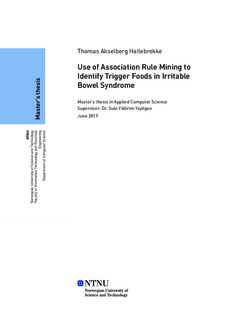| dc.contributor.advisor | Yayilgan, Sule Yildirim | |
| dc.contributor.author | Hatlebrekke, Thomas Akselberg | |
| dc.date.accessioned | 2020-02-12T15:01:01Z | |
| dc.date.available | 2020-02-12T15:01:01Z | |
| dc.date.issued | 2019 | |
| dc.identifier.uri | http://hdl.handle.net/11250/2641410 | |
| dc.description.abstract | Oppgaven tar i bruk maskinlæring på kostholds- og symptomregistreringer som er samlet inn fra seks IBS-pasienter i en periode på 12 til 16 dager. Apriori-algoritmen er brukt til å finne assosiasjonsregler som identifiserer relasjoner mellom mat og IBS-symptomer. Resultatene har blitt tolket av seks klinikere fra Nasjonal kompetansetjeneste for funksjonelle mage-tarmsykdommer ved Haukeland Universitetssjukehus.
Resultatene og tolkningen fra klinikerne viser at relasjoner mellom mat og IBS symptomer kan identifiseres ved bruk av assosiasjonsregler. Tilnærmingen kan være nyttig i et beslutningsstøttesystem for klinisk ernæringsfysiologer som skal gi kostholdsråd til IBS-pasienter. | |
| dc.description.abstract | This work applies association rule mining (ARM) to dietary- and symptom registrations collected from six irritable bowel syndrome (IBS) patients over periods of 12 to 16 days. The Apriori algorithm is used to generate frequent itemsets from the data and discover association rules identifying relationships between foods and IBS symptoms. The results were interpreted by six clinicians from "National competency service for functional gastrointestinal diseases" at Haukeland University Hospital.
The results and interpretations from the clinicians show that relationships between foods and IBS symptoms can be identified using ARM, and that the approach can be useful in a decision support system for clinical nutritionists in consulting IBS patients. | |
| dc.language | eng | |
| dc.publisher | NTNU | |
| dc.title | Use of Association Rule Mining to Identify Trigger Foods in Irritable Bowel Syndrome | |
| dc.type | Master thesis | |
